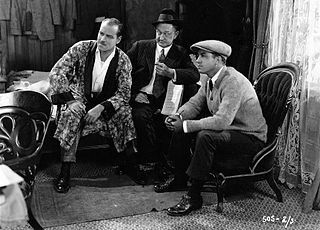
Charles Edgar Schoenbaum A. S. C. was an American cinematographer. His known film credits began in 1917—although he probably had earlier films—and ended with his untimely death from cancer in 1951 at age 57. He was nominated for an Academy Award in 1949 for his work on Little Women.

Vera Reynolds was an American film actress.
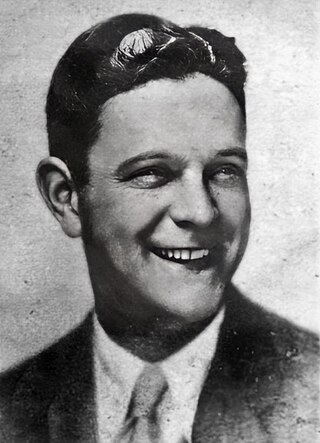
Glenn Tryon was an American film actor, screenwriter, director and producer. He appeared in more than 60 films between 1923 and 1951.

Beau Ideal is a 1931 American pre-Code adventure film directed by Herbert Brenon and released by RKO Radio Pictures. The film was based on the 1927 adventure novel Beau Ideal by P. C. Wren, the third novel in a series of five novels based around the same characters. Brenon had directed the first in the series, Beau Geste, which was a very successful silent film in 1926. The screenplay was adapted from Wren's novel by Paul Schofield, who had also written the screenplay for the 1926 Beau Geste, with contributions from Elizabeth Meehan and Marie Halvey.

Dinty is a 1920 American silent comedy drama film written by Marshall Neilan and John McDermott specifically for Wesley Barry, a young actor known for his freckled complexion. Prominent among the supporting players were Colleen Moore, Marjorie Daw, Pat O'Malley, and Noah Beery.

Traveling Husbands is a 1931 American pre-Code drama film directed by Paul Sloane based on a screenplay by Humphrey Pearson. The film stars Constance Cummings, Frank Albertson, Evelyn Brent, Dorothy Peterson and Hugh Herbert. Hugh Herbert's brother, Tom, made his screen debut with a small role in this film, billed as Tom Francis. Produced and distributed by RKO Radio Pictures, the film premiered in New York City on August 7, 1931, and was released nationwide the following week on August 15. It received mixed reviews from the critics.
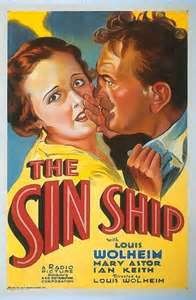
The Sin Ship is a 1931 American pre-Code drama film produced and distributed by RKO Radio Pictures and directed by the actor Louis Wolheim in his only directorial effort. The film marks the last contribution Wolheim made to the film industry prior to his death from cancer one month shy of his fifty-first birthday. In addition to directing, Wolheim also starred in the picture, alongside Mary Astor and Ian Keith. The screenplay was written by Hugh Herbert, from a story by Keene Thompson and Agnes Brand Leahy. The film was released in April 1931, two months after Wolheim's death, and is preserved at the Library of Congress.

The Common Law is a 1931 American pre-Code romantic drama film directed by Paul L. Stein, produced by Charles R. Rogers and starring Constance Bennett and Joel McCrea. Based on Robert W. Chambers' 1911 novel of the same name, the film was the third film adaptation of the book, and the first during the sound-film era. It was received well both at the box office and by film critics, becoming one of RKO's most financially successful films of the year.
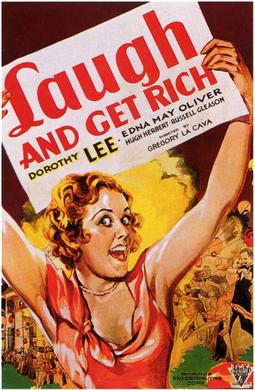
Laugh and Get Rich is a 1931 pre-Code American comedy film, directed by Gregory La Cava, from a screenplay he also wrote with contributions from Douglas MacLean, who also was the associate producer, and Ralph Spence. The film stars Dorothy Lee, Edna May Oliver, Hugh Herbert, and Russell Gleason, and revolves around the antics in a boarding house in the early 1930s, run by Oliver, and the complications caused by her husband.
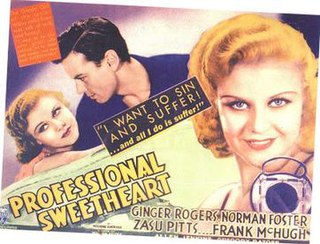
Professional Sweetheart is a 1933 American pre-Code romantic comedy directed by William A. Seiter from a screenplay by Maurine Watkins. It stars Ginger Rogers in her first film for RKO Radio Pictures, with Norman Foster, ZaSu Pitts and Frank McHugh. The film is a satire of the radio industry; since it is pre-code, Rogers spends some of her time in high heels, stockings, and a slip.

By Your Leave is a 1934 American domestic comedy film directed by Lloyd Corrigan from a script by Allan Scott, Lewis Foster, and Sam Mintz. The screenplay was based on a play of the same name by Gladys Hurlbut and Emma B. C. Wells, which had a short run early in the year at the Morosco Theatre. The film was produced by Pandro S. Berman, and starred Frank Morgan and Genevieve Tobin, although several other actresses were initially scheduled to appear in the film, including Mary Astor and Ann Harding. Both stars were on loan to RKO from other studios. It marked the film debuts of two notable Broadway actors, Glenn Anders and Gene Lockhart, the latter of which had a lengthy Hollywood career. By Your Leave opened on November 9, 1934, and received mostly positive reviews.

The Arizonian is a 1935 American Western film directed by Charles Vidor and starring Richard Dix, Margot Grahame, Preston Foster, and Louis Calhern. The screenplay was by Dudley Nichols. The film was released by RKO Radio Pictures on June 28, 1935.
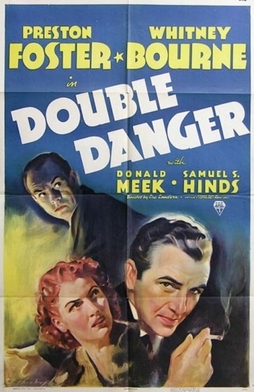
Double Danger is a 1938 American crime drama directed by Lew Landers, using a screenplay by Arthur T. Horman and J. Robert Bren based on Horman's story. The film stars Preston Foster and Whitney Bourne, with supporting roles by Donald Meek and Samuel S. Hinds. Produced by RKO Radio Pictures, it was released on January 28, 1938.
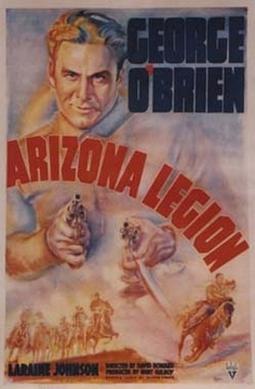
Arizona Legion is a 1939 American Western film directed by David Howard from a screenplay by Oliver Drake, based on Bernard McConville's story. Produced and distributed by RKO Radio Pictures, it was released on January 20, 1939, and stars George O'Brien and Laraine Day.

Shoes is a 1916 silent film drama directed by Lois Weber and starring Mary MacLaren. It was distributed by the Universal Film Manufacturing Company and produced by Bluebird Photoplays, a subsidiary of Universal based in New York City and with access to Universal's studio facilities in Fort Lee, New Jersey as well as in California. Shoes was added to the National Film Registry in 2014.
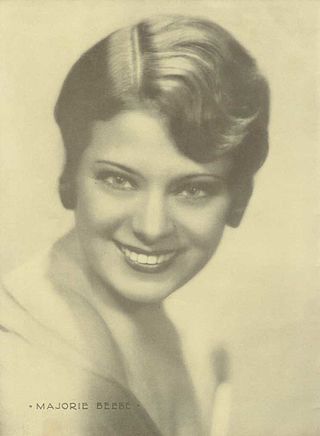
Marjorie Eileen Beebe was an American film actress.
Cyclone Higgins, D.D. is a 1918 silent American comedy-drama film, directed by Christy Cabanne. It stars Francis X. Bushman, Beverly Bayne, and Baby Ivy Ward, and was released on May 13, 1918.
The Faker is a 1929 American silent melodrama film, directed by Phil Rosen. It stars Jacqueline Logan, Charles Delaney, and Warner Oland, and was released on January 2, 1929.

Checkers is a 1919 American silent melodrama film, directed by Richard Stanton. There are no known archival holdings of the film, so it is presumably a lost film. The film is based on the screenplay with the same name by Henry Blossom. Mazie LaShelle Hunt and Marjorie Seely Blossom, the widows of Kirke La Shelle and Henry Blossom respectively, filed a lawsuit in the Supreme Court against Fox Film regarding the sale of the film.

Neck and Neck is a 1931 American pre-Code drama film directed by Richard Thorpe from a script by Betty Burbridge and starring Glenn Tryon, Vera Reynolds and Walter Brennan.


















